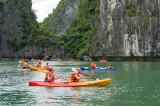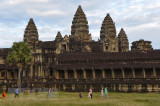Healing tourism trend prompts service suppliers to become more dynamic
The rising trend of healing tourism has prompted service suppliers to design more diverse tours to meet travelers’ demands.
Healing tourism, which combines traditional tourism activities with health care activities, has been popular in the world but is still new in Vietnam. However, this tourism type has drawn a rising number of domestic tourists.
Wanting to escape stress from work and life, Le Thu Hoa from Cau Giay district of Hanoi chose Mu Cang Chai in Yen Bai as a hideaway place for her and her family. They had interesting experience joining locals in farming activities.
Hoa said that physical work helped her and other members of her family feel relaxed and excited, especially the children because they got to experience new things that are not available in the city.
Meanwhile, Le Hoai Nam in Hoan Kiem district of Hanoi chose the Mekong Delta region for his family trip, during which they joined many eco-tourism activities that are suitable to particular ages of each member.
While Nam and his children experienced catching fish with locals, his parents attended Yoga and meditation courses besides the massive fields of Dong Thap Muoi area in Dong Thap province.
The activities helped them become more balanced mentally and stronger physically and fostered family connections which have been affected by work and social factors, said Nam.
According to the Vietnam National Authority of Tourism (VNAT), the development of science and technology, as well as climate change, pollution and stress have brought about many negative impacts on people’s health, especially mental health.
Therefore, more people are paying more and more attention to caring for their health and reducing stress, leading to the development of healing tourism with the unique combination of exploring and healing activities basing on nature. This kind of tourism is predicted to boom in Vietnam and the world, the VNAT said.
A report by the Global Wellness Institute showed that as of the end of 2022, revenues of healing tourism reached 919 billion USD, accounted for 18% of total revenue of the global tourism sector.
In Vietnam, many travel firms have invested in healing tourism with diverse products to meet the demand of domestic and foreign tourists.
Recently, the northern province of Lao Cai, home to the famous tourist destination of Sa Pa, has introduced healing tourism tours which provide visitors with Yoga exercise and traditional health care in combination with exploring the local life and culture.
In the Mekong Delta region, Dong Thap, which boasts great potential for healing tourism thanks to its popular lotus farms, has introduced many lotus-based tourism products together with unique and healthy dishes made of lotus.
However, as a new tourism type, healing tourism has yet to receive systematic investment in many tourist destinations, and has not been combined with other tourism kinds and products. Meanwhile, human resources for this kind of tourism have yet to meet the increasing demands of tourists, especially foreigners.
Therefore, experts underlined the need for authorised agencies to design suitable policies to encourage businesses to invest more in healing tourism and enhance the management efficiency over this promising tourism type./.
VNA
 Agoda lists Da Lat among cheapest destinations for year-end holidays
Agoda lists Da Lat among cheapest destinations for year-end holidays
 TasteAtlas picks out two Vietnamese dishes among world’s 100 best rated crustacean dishes
TasteAtlas picks out two Vietnamese dishes among world’s 100 best rated crustacean dishes
 Vietravel expands business in Indian market
Vietravel expands business in Indian market
 2025 Nha Trang – Khanh Hoa Sea Festival to spotlight cultural heritage space
2025 Nha Trang – Khanh Hoa Sea Festival to spotlight cultural heritage space
Vietnam, a unique destination attracting Indian tourists: Indian newspaper
 Cao Bang eyes new opportunities for cross-border tourism development
Cao Bang eyes new opportunities for cross-border tourism development
 Kien Giang strives to attract tourists to finish the year on high note
Kien Giang strives to attract tourists to finish the year on high note
 Rivers provide major resources to boost Vietnam’s tourism
Rivers provide major resources to boost Vietnam’s tourism
 Dong Thap plants over 100 ha of flowers for Tet
Dong Thap plants over 100 ha of flowers for Tet
 Donghai Airlines launches direct route to Khanh Hoa
Donghai Airlines launches direct route to Khanh Hoa



